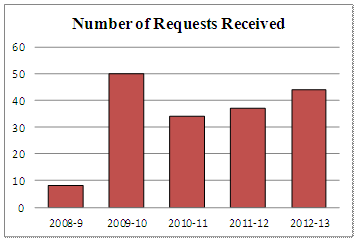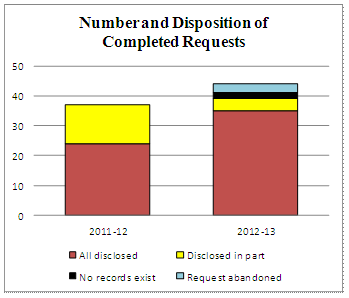Annual Report on the Privacy Act for the Period Ending March 31, 2013
3. Statistical Report on the Administration of the Privacy Act
This section provides an interpretation of select statistics on the processing of requests made to Elections Canada under the Privacy Act. The full figures for the 2012–2013 fiscal year are provided in the attached report (see appendices II and III).
3.1 Number of Requests
Elections Canada received 44 formal requests for personal information during the 2012–2013 fiscal year, a 19 percent increase over the last year. It also finished processing one outstanding request from the 2011–2012 reporting period. Most of these requests were completed with the timely and efficient collaboration of the Electoral Data Management and Readiness Directorate.
By the end of the fiscal year, the ATIP Office had completed 44 formal requests. One request was outstanding, and it was carried forward into fiscal year 2013–2014.
3.2 Disposition of Completed Requests
Of the 44 requests completed during the reporting period, 35 resulted in full disclosure of the records requested. This represents 80 percent of all completed requests, up from 65 percent in the previous fiscal year. Four requests resulted in partial disclosure, where the personal information of individuals unassociated with the request was exempted as per section 26 of the Privacy Act. In two instances, no records were found to exist. In three instances, requests were abandoned by the applicant.
3.3 Completion Time
In keeping with last year's results, 100 percent of requests for personal information were completed within 30 days.
3.4 Disclosure of Personal Information Under Paragraph 8(2)(m)
Subsection 8(2) of the Privacy Act describes the circumstances under which a government institution may disclose personal information under its control without the consent of the individual to whom the information relates. Such disclosures are discretionary and are subject to any other Act of Parliament.
Paragraph 8(2)(m) stipulates that an institution may disclose personal information for any purpose where, in the opinion of the head of the institution, the public interest in the disclosure clearly outweighs any invasion of privacy that could result from it or where the disclosure would clearly benefit the individual to whom the information relates.
Elections Canada did not disclose any personal information pursuant to paragraph 8(2)(m) during the reporting period.
3.5 Fees and Costs
There is no charge to individuals for processing requests under the Privacy Act.
For fiscal year 2012–2013, the budget for salaries of the employees assigned to the administration of the Privacy Act totalled $110,400, while the budget for operating and maintenance costs came to $127,205. Much of the total Privacy budget was allocated to privacy-related activities outside of formal requests for personal information.


